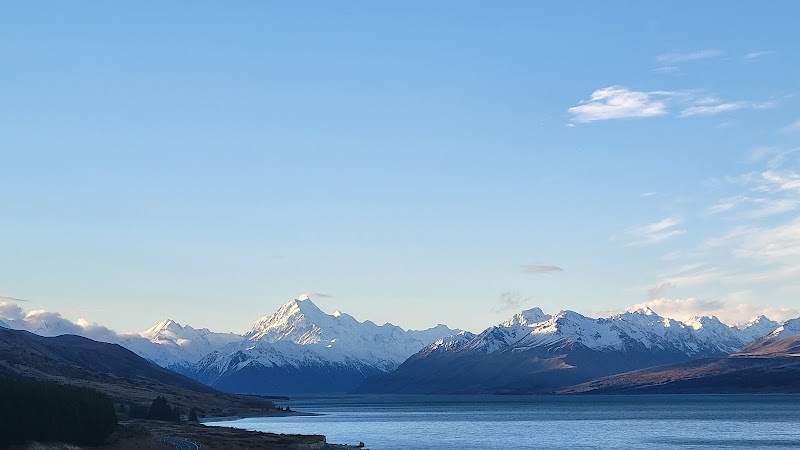Hooker Valley Track: Your Gateway to Aoraki/Mount Cook’s Iconic Views
Experience the Hooker Valley Track for a rewarding hike with spectacular views of Aoraki/Mount Cook. This approachable trail offers a blend of serene river crossings, alpine landscapes, and glacial vistas, perfect for adventurers ready to embrace New Zealand’s rugged heart.
Start Early to Beat the Crowds and Winds
Begin your hike in the morning to enjoy peaceful walking and the best lighting conditions for photography before stronger afternoon alpine winds pick up.
Wear Waterproof and Grippy Footwear
The trail has gravel surfaces that can get slippery when wet or icy; sturdy boots with good traction will keep you safe.
Pack Water and Snacks
There are no facilities along the track, so bring sufficient water (at least 2 liters) and energy-rich snacks to stay fueled and hydrated.
Prepare for Rapid Weather Changes
Layered clothing is a must; temperatures can drop quickly, and rain or sun exposure varies significantly with altitude and time of day.
Hooker Valley Track: Your Gateway to Aoraki/Mount Cook’s Iconic Views
The Hooker Valley Track offers a compact yet commanding experience in the shadow of New Zealand’s tallest peak, Aoraki/Mount Cook. Starting from the Aoraki/Mount Cook Village car park, this 10-kilometer return hike guides you over well-maintained gravel paths and suspension bridges that dare you to step lightly as the Hooker River rushes beneath. The trail's gentle overall elevation gain of roughly 100 meters is accessible to hikers of varying skill levels but demands respect for its alpine environment.
The first section leads through a cool beech forest, where moss-clad branches sway, nudging you onward. As the forest opens, the valley's rugged character asserts itself: sculpted glaciers perched on distant peaks, and wild river currents pushing forward relentlessly. Cross three suspension bridges that both rock and thrill; these crossings offer up-close views of glacial-fed waters— icy and swift.
Reaching Hooker Lake at the trail’s end, the landscape unfolds dramatically. Floating icebergs drift quietly in the cold glacial lake. Behind, the jagged summit of Aoraki/Mount Cook sits fiercely itself, often crowned by swirling clouds that move as if breathing. On clear days, the mountain’s imposing face is unforgettable—sharp angles and snow fields glowing under sunlight. Around you, the valley holds the patient silence of the high country, punctuated only by occasional birdcalls and the distant crack of shifting ice.
For planning your adventure, start early to avoid afternoon winds and capture the best light for photography. The trail, although well-signposted, can become slick with rain or ice—sturdy, waterproof hiking boots are a must. Bring layered clothing: temperatures can shift rapidly at alpine elevations. Hydration is equally essential; carry at least two liters of water as there are no refill points on the track.
While the hike itself is moderate, allow around 3-4 hours to comfortably absorb the scenery and take in the viewpoints. Local guides often recommend pairing your walk with a visit to the Sir Edmund Hillary Alpine Centre or a boat tour on Lake Pukaki nearby for a full day experience.
This track balances thrill with accessibility—offering raw mountain beauty without the extreme demands of more technical climbs. It’s ideal for families, casual hikers, and seasoned adventurers who value photographing peak vistas framed by braided rivers and glaciers. Respect the environment, stay on the trail, and prepare for changing weather—for this valley insists you meet it with focus and care, rewarding all who do with spectacular, lasting impressions.
Nearby Trips
All Adventures
Boat Charters
Water Activities
Adventures near Twizel
Discover the unique and memorable adventures that make Twizel special.
Frequently Asked Questions
How long is the Hooker Valley Track and how difficult is it?
The track is approximately 10 kilometers return, with an elevation gain of around 100 meters, making it moderate in difficulty. It’s accessible to most fit walkers and families but requires steady pace and awareness of alpine weather.
Are there facilities along the Hooker Valley Track?
No facilities exist on the trail itself. Restrooms and visitor services are available in Aoraki/Mount Cook Village at the trailhead, so plan accordingly before starting your hike.
When is the best time of day to hike for the clearest views of Mount Cook?
Early mornings are ideal for calmer winds and clear skies. Late afternoon can also provide dramatic lighting but weather can be more changeable then.
Is the Hooker Valley Track suitable for children or elderly hikers?
Yes, the track is well-formed and has gentle gradients, making it suitable for families and older hikers comfortable with a moderate length walk.
Can you swim or kayak in Hooker Lake?
Hooker Lake is glacial and very cold year-round, making swimming unsafe. Kayaking is not allowed to protect the fragile environment and safety near glacial ice.
Are dogs or pets allowed on the Hooker Valley Track?
Pets are not permitted within Aoraki/Mount Cook National Park to protect native wildlife and the delicate alpine ecosystem.
Recommended Gear
Waterproof hiking boots
Necessary for traction and ankle support on gravel and potentially slippery surfaces.
Layered clothing system
Allows you to adjust to rapidly shifting mountain weather from cool mornings to warmer midday sun.
Water bottle or hydration pack
Hydration is critical since there are no water sources to refill along the track.
Sun protection (hat, sunscreen)
UV rays intensify at altitude; protection reduces risk of sunburn on exposed sections of the trail.
Local Insights
Hidden Gems
- "Lesser-known viewpoint at the base of Mueller Hut Track offers quieter perspectives overlooking the valley."
- "The boulder-strewn riverbanks near the first suspension bridge provide unexpected spots to observe braided river behavior."
Wildlife
- "Keep an eye out for kea, New Zealand’s alpine parrot, known for curious and bold behavior around hikers."
- "You might also spot rock wren and the occasional alpine falcon soaring against the backdrop of peaks."
History
"The Hooker Valley derives its name from the Hooker Glacier, named after botanist Joseph Dalton Hooker. The region holds cultural significance for the Ngāi Tahu iwi as part of their ancestral lands."

